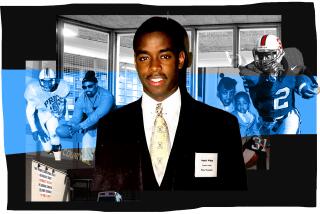Key Witness Recants Testimony About Costa Mesa Murder
- Share via
The case against San Francisco accountant Richard Dale Wilson, charged with the revenge killing of the man accused of murdering Wilson’s fiancee, hit rough waters Thursday when a key prosecution witness recanted his previous testimony alleging that Wilson had made death threats.
Richard Clinton Hale, Wilson’s brother-in-law, testified before the Orange County Grand Jury in March that Wilson had told him “he was going to try to kill” Jeffrey Malloy Parker. Hale also testified that he thought Wilson had made the statement just one day before Parker was murdered.
Called as a prosecution witness at Thursday’s preliminary hearing, Hale said he had given the matter more thought and now believes the remark came about a month after Wilson’s fiancee, Joan McShane Mills, was killed--which would be about three months before Parker’s murder.
Hale testified that Wilson was reacting to an autopsy report on the extent of Mills’ injuries. According to Hale, Wilson was in tears and said, “I’ll kill the son of a bitch” or “Somebody should kill the son of a bitch.”
Deputy Dist. Atty. Douglas H. Woodsmall said he believes that Hale changed his testimony out of fear. Woodsmall obtained permission from Harbor Municipal Court Judge Brian R. Carter to treat Hale as a hostile witness, which gives the prosecutor more leeway in questioning. Woodsmall said he will have “many more questions” when the hearing is scheduled to resume this afternoon.
Wilson’s fiancee, Mills, a San Francisco socialite, was 33 when she was found nude and battered in a Beverly Hills hotel room April 30, 1983. She died of extensive internal injuries later that morning.
Standing over her when she was found was Parker, 37, an unemployed printing salesman who told police he had met Mills in a bar. He said he had only tried to resuscitate her after she collapsed during a night of drinking, drugs and sex.
Parker was charged with Mills’ murder, but at about 11:45 p.m. on Aug. 2, 1983, the day before his preliminary hearing, he was shot twice in the chest and head as he walked to his mother’s front door in Costa Mesa.
The prosecution’s second major witness, Wilson’s brother, Okel A. Wilson of Modesto, stuck to his original testimony--that Richard Wilson had confessed the murder to him eight days after it had occurred. He repeated his impression, however, that Richard Wilson had been bragging and had not been telling the truth.
But Okel Wilson underwent a hammering cross-examination from defense attorney Joel W. Baruch, who delved into Wilson’s history of alcoholism, his use of cocaine and his self-reported suicide attempt.
Baruch also tried to get into the record Wilson’s self-admitted history of bigamy.
Wilson conceded that he had been drinking and using drugs heavily during the six months before he says his brother confessed to him. He said the confession took place just two days before he admitted himself to a hospital for treatment of alcoholism.
Asked by Baruch whether he was going through “the worst alcoholic stupor you’d ever had in your life” at the time of his hospital admission, Wilson said, “Yes.” He also conceded he thought he might be near death at that time.
“Did you hear things that weren’t said?” Baruch asked.
“That’s a possibility,” Wilson replied.
Wilson insisted, however, that he clearly remembered his brother telling him about killing Parker, despite the quart of whiskey and a quarter-gram of cocaine they had consumed. He repudiated a declaration he had signed in April for a defense investigator that states “my memory is very poor, and I have trouble remembering accurately or at all things that happened only a few months ago.”
Baruch asked Wilson whether in 1983, while driving under the influence of alcohol, he had killed a pedestrian and had switched seats with his wife to avoid arrest.
“That’s not true,” Wilson said, adding that the victim in that incident “only broke his leg.” He conceded that the rest of the account was true.
Baruch also asked Wilson whether he had told his wife that he had been married to three women simultaneously, and Wilson answered, “Yes,” before Woodsmall could object. The question and answer were then stricken from the record as irrelevant.
More to Read
Sign up for Essential California
The most important California stories and recommendations in your inbox every morning.
You may occasionally receive promotional content from the Los Angeles Times.













